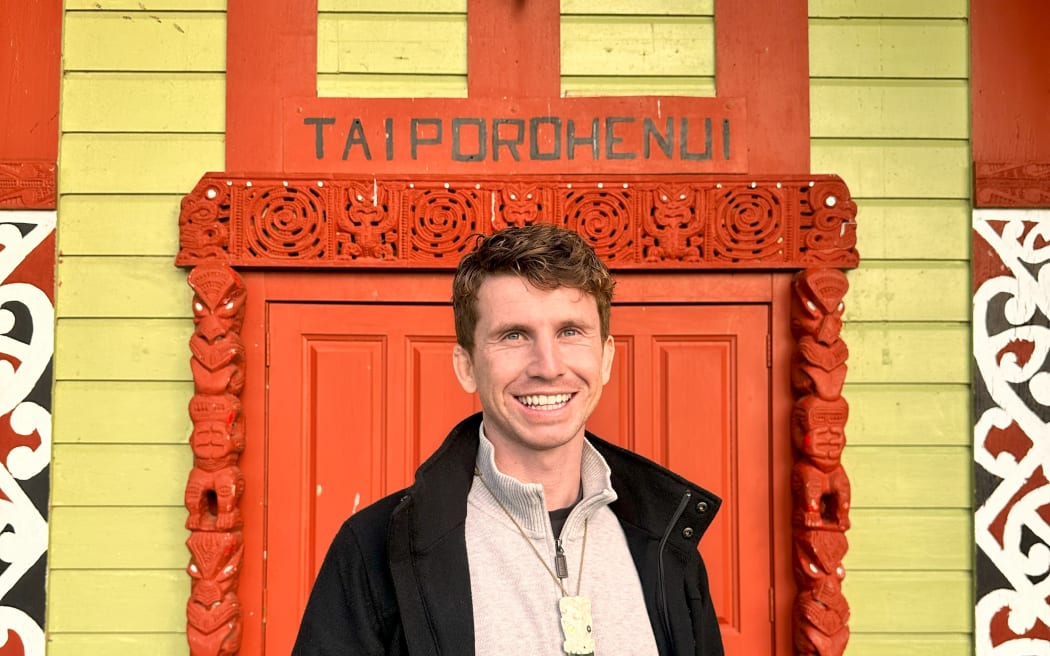Entertainment
Author Airana Ngarewa Unveils ‘The Last Living Cannibal’

Author Airana Ngarewa has launched his latest book, titled ‘The Last Living Cannibal’, which delves into a reimagined narrative of life in Taranaki during the 1940s. Ngarewa, who has previously focused on contemporary themes, is embarking on a nationwide tour for book signings and appearances at literary festivals. This new work, he explains, is shaped by his family’s history and personal connections to the region.
In an interview with *Afternoons* host Jesse Mulligan, Ngarewa revealed that while many of his previous books reflect his family’s contemporary experiences, this one allows him a creative freedom, particularly because it explores a historical period. He quipped, “When you write about 1940, at least when they ask you ‘hey, is this about me?’ I can lie.”
Historical Context and Inspiration
The provocative title of the book is rooted in the legacy of Tītokowaru, a leader of the Ngāruahine people who led a resistance against colonial forces in 1868. Ngarewa highlights that at the onset of war, Tītokowaru had only 60 warriors, which necessitated a guerrilla approach to combat. He strategically drew colonial commander Thomas McDonnell into confrontations on home soil, including a notorious act of violence that involved the ritual consumption of a colonial soldier’s body.
Ngarewa’s narrative is set against the backdrop of 1940, a time when many Māori in Taranaki and Waikato chose not to enlist in the Māori Battalion. This historical setting emerged from discussions held at Ngarewa’s marae, Pariroa, located just outside of Pātea. During these gatherings, families returned to share their stories, enriching Ngarewa’s understanding of their collective past.
Connecting to Heritage and Storytelling
Ngarewa expressed gratitude for the opportunity to engage with his community and the stories that have shaped their identity. His family can trace their lineage back to Ngāti Ruanui, Ngāruahine, and Ngā Rauru, connected to the arrival of Turi, captain of the Aotea waka. The family’s roots in Pātea have remained strong, except for a brief period when they faced imprisonment for their involvement in Tītokowaru’s campaign.
Upon their return to Taranaki in 1872, churches were established on significant battle sites, symbolizing a shift towards Christianity as a means of reconciling with colonial authority. Ngarewa noted that many stories from this era were overlooked until they began resurfacing during his father’s lifetime. He stated, “These stories were lost for a significant period of time and only until my own father’s time did these stories begin to kind of bubble up.”
Despite addressing serious themes, Ngarewa emphasizes the importance of infusing Māori narratives with humor. He explained that humor plays a vital role in Māori culture, often surfacing alongside serious discussions during ceremonial gatherings. This blend of lightness and gravity is something he has worked to incorporate into his writing. An example includes a character named Dairy, reflecting his Irish heritage, which showcases Ngarewa’s unique storytelling style.
‘The Last Living Cannibal’ promises to offer readers a thought-provoking exploration of Māori history, resilience, and the complexities of identity. As Ngarewa continues his tour, audiences can expect to engage deeply with the narratives that have shaped not just his family, but the wider Māori community in New Zealand.
-

 World3 months ago
World3 months agoTest Your Knowledge: Take the Herald’s Afternoon Quiz Today
-

 Sports3 months ago
Sports3 months agoPM Faces Backlash from Fans During Netball Trophy Ceremony
-

 Lifestyle3 months ago
Lifestyle3 months agoDunedin Designers Win Top Award at Hokonui Fashion Event
-

 Sports3 months ago
Sports3 months agoLiam Lawson Launches New Era for Racing Bulls with Strong Start
-

 Lifestyle3 months ago
Lifestyle3 months agoDisney Fan Reveals Dress Code Tips for Park Visitors
-

 World3 months ago
World3 months agoCoalition Forms to Preserve Māori Wards in Hawke’s Bay
-

 Health3 months ago
Health3 months agoWalking Faster Offers Major Health Benefits for Older Adults
-

 Politics3 months ago
Politics3 months agoScots Rally with Humor and Music to Protest Trump’s Visit
-

 Top Stories3 months ago
Top Stories3 months agoUK and India Finalize Trade Deal to Boost Economic Ties
-

 World3 months ago
World3 months agoHuntly Begins Water Pipe Flushing to Resolve Brown Water Issue
-

 Entertainment3 months ago
Entertainment3 months agoExperience the Excitement of ‘Chief of War’ in Oʻahu
-

 Science3 months ago
Science3 months agoNew Interactive Map Reveals Wairarapa Valley’s Geological Secrets









